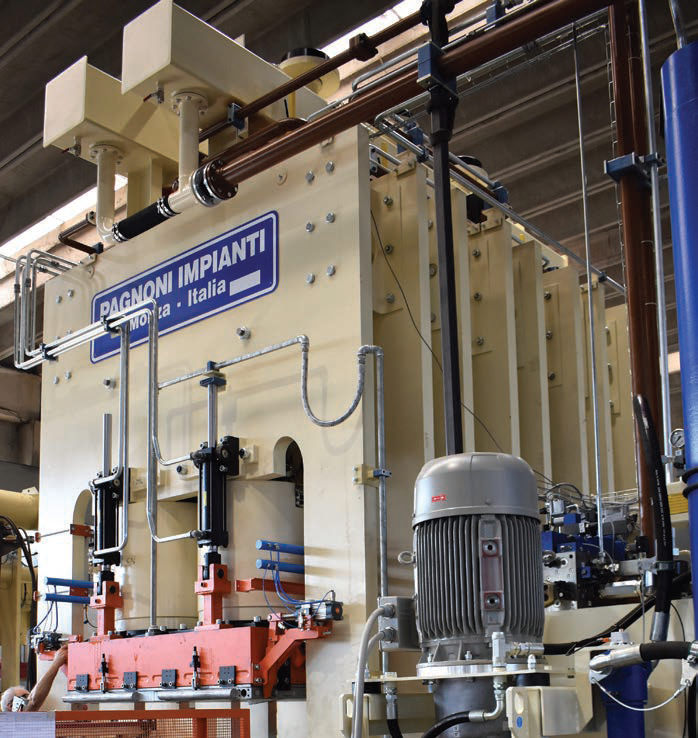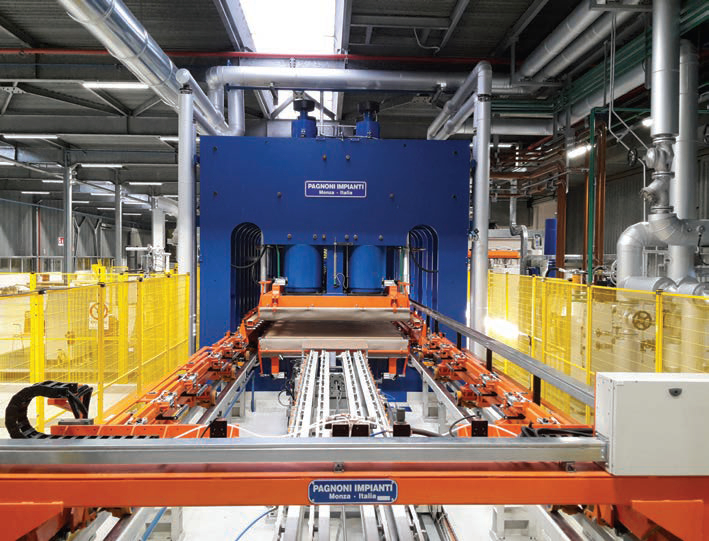Pagnoni presses on
16 November 2021The name Pagnoni can be seen on presses all over the world in both primary wood-based panels production and lamination of value-added panels. Stephen Powney interviews managing director Michele Pagnoni about the company’s recent developments
Based near Monza, Pagnoni Impianti is one of the longest established Italian woodworking plant manufacturers in Italy and its machinery can be found across the world.
Founded in 1848, originally making presses in the food industry, the company produces a variety of press technologies for the wood-based panels industry, with the core of its offering serving the value-added short cycle press (SCP) and high pressure laminate (HPL) markets for application of melamine papers, or other decorative surfaces, to panels.
When I caught up with managing director Michele Pagnoni, he said he was looking forward to meeting customers and attending exhibitions again. He had recently welcomed some Russian businessmen to the Pagnoni factory to discuss a project, as well as travelling to Spain to see a customer.
“The first contact with customers can now be remotely, online, which is a good way to start to know each other,” he said.
But, he added, there was no substitute for meeting face-to-face or going a traditional physical exhibition and having those chance conversations and expressions of interest from people who happen to pass the stand.
“With digital events it is more about marketing. In December we will attend Woodex exhibition in Russia and I can’t wait, we want to go and meet both existing customers and new customers. We haven’t seen them in these past two years. So, I hope the exhibition season will be restarting once more.”
BUSINESS REBOUNDS FROM COVID
“Our region was the area in Italy where the effect from Covid was the greatest,” continued Mr Pagnoni.
“We faced a difficult period from March 2020 and immediately started with smart working. Honestly speaking, I was happy about the reaction of our employees. I was pleased with their quality of work, it is something we have learned from this terrible [pandemic] situation.”
Pagnoni’s delivery operations were halted for three months during the start of the pandemic. But Mr Pagnoni said the summer of 2020 brought better times.
“In the beginning of the summer, things moved on quite quickly and we received new orders for plants and spare parts – things were getting back to the normal business range. There was another stop during the last winter in the north of Italy due to Covid but we were prepared.
“Now we have to see what is going to happen in the next months but I’m not so afraid as we have found a way to live with this situation.”
Pagnoni’s 2020 business performance, like most companies, was down on expectations but 2021/22 is predicted to be better.
“We have bigger equipment under construction at the moment in our facilities. We are going to deliver one big line before the end of the year to a central Asia customer. This is a big plant for high pressure laminates with all the finishing equipment, so we are happy about this year and we can see things will move back to positive business.”
Mr Pagnoni said the company’s technology for short cycle lamination and high pressure laminates was core to Pagnoni. “We are at the ‘A’ level for the quality for this kind of business.”
For short cycle lamination, Pagnoni is producing single opening presses with very fast cycles up to 200 cycles per hour, giving big performance in terms of capacity and flexibility. “We need to be very accurate in the paper lay-up, with the panel and pressing texture. Our technology is the latest generation in these aspects.”
Mr Pagnoni explained flexibility was the key strength of Pagnoni.
“Twenty years ago, we were following the requirements of the customer in every single detail, but now have some standard offerings and we can supply a machine according to your needs making little modifications or giving you a range of options and you can choose within that range. This flexibility is really appreciated with our customers.”
The Russian customer visiting the Monza production site recently is looking at a double project, including a short cycle press line.
“I am really proud of our recent projects, we have worked with single companies and groups. We made a big revamping of a line last year. We are working with companies such as Fantoni, Saviola and Kastamonu.”
HPL is another big area of expertise for Pagnoni, featuring presses with longer cycles of 30min to 1hr.
Specific press pressure can be applied up to 100 kg/cm² with platen size up to 2200mm x 6350mm.
FARLINE is Pagnoni’s multi-opening press line, coming as either a standard or customisable solution. The fully automatic system is for high production capacity of HPL, postforming and compact laminates.
ONELIGHT is a pressing line with a single opening press, suitable to produce the classical postforming certified HPL and compact or particleboard and MDF laminated with decorative melamine impregnated paper.
HPL plants can be massive, with a lot of steel, so efficient thermal cycles are very important.
“We have worked a lot studying the thermal dynamic aspects of the cycle. We calculate and design the plate to be heated and cooled in the most effective way.
“In order to save energy we need to have a high level of automation in the circulation of the fluid. The plant we are going to supply to central Asia will feature these options – basically a big energy saving in the process.”
Pagnoni says its efficient technology guarantees 50% recovery of the energy used.
“We have very interesting negotiations in Europe for this kind of HPL plant with added-value energy saving.”
Another area of business for Pagnoni is phenolic lamination of plywood using single or multi-opening presses.
“In the last 20 years we supplied several lines for phenolic lamination but these were lines with single opening presses. This is something which can be good for the customer for flexibility but not if they need massive production.
“After receiving several requests from Russia for multi-opening presses we decided to make multi-opening presses for this market – designing the whole line. We have sown the seeds by supplying a project in the Kirov region during the pandemic and now we hope for further business.”
Phenolic-faced birch plywood is used for various applications including concrete shuttering and lining of trucks.
Pagnoni retains the expertise to be able to manufacture press lines for producing raw wood-based panels, but its primary focus these days is on the value-added panels sector.
EMBOSSED IN REGISTER (EIR)
Pagnoni is very active in supplying embossed in register (EIR) press technology.
The technology has become very popular in recent years and gives laminate surfaces a texture that actually follows the pattern of the surface image, giving it an authentic real wood look.
Fine indentations match the underlying image of a wood plank, similar to the grain of a plank cut from a tree and gives an impressive depth of colour to the surface.
“We have made our own system for EIR short cycle lamination,” continued Mr Pagnoni.
“We have supplied a line to Russia for a single opening press for EIR on both sides and for compact laminates. There are requests about EIR technology from every sector – short cycle, HPL and compact. This is the big innovation requirement requested from most customers.”
For EIR surfaces two technical aspects have to match together – the automation to give the right position of the top and bottom paper and then the pressure supplied by the press itself to the panel.
“We have developed a particular pressing cycle matching these technologies which can make the difference for this process. We have perfected it in the last three to four years and it is a very interesting solution for the market.”
Pagnoni’s first EIR plant was constructed in 2015.
THE FUTURE
Looking to the future, Mr Pagnoni said material availability and price increases were issues for all manufacturers of plants. Due to constantly changing steel prices, project quotations are reviewed more regularly and supplies of some mechanical and electronic elements are proving more difficult in Europe recently.
But he is confident customer demand will increase, though not necessarily in every product sector.
“I’m sure our sector is going to invest in new machines and upgradings. Our job is to understand the direction of the market. We must be very smart in understanding what kind of market needs to be followed.”

